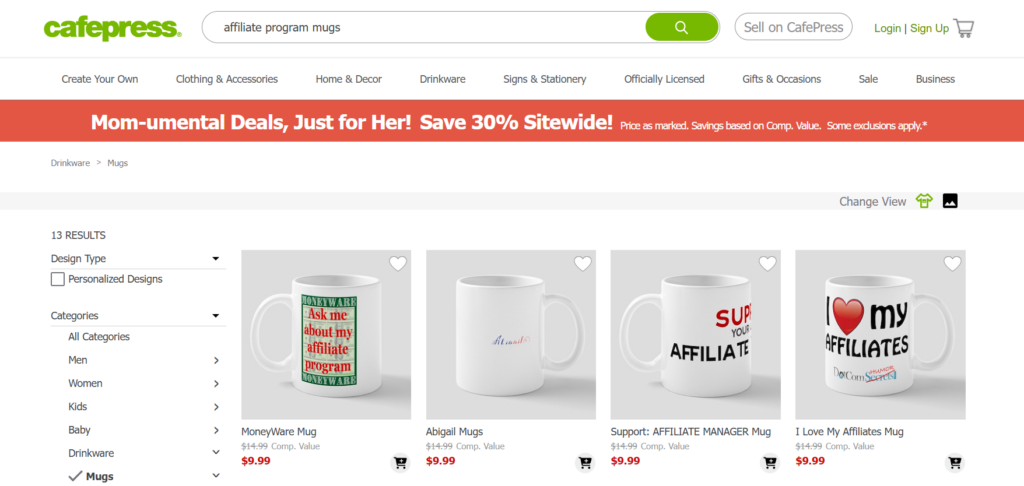CafePress is a leading e-commerce platform specializing in customizable products. Founded in 1999, it operates as a subsidiary of PlanetArt and is headquartered in Louisville, Kentucky. The platform enables users to create, purchase, and sell personalized items, including clothing, drinkware, home decor, stationery, and more. It caters to both individual consumers and businesses, offering tools for personal expression and entrepreneurial ventures. CafePress has gained recognition for its user-friendly interface and innovative print-on-demand (POD) services.

Key Features of CafePress
1. Customization Tools
- Allows users to upload designs, logos, or text to customize a wide range of products.
- Offers real-time previews to visualize the final product before purchase.
- Supports various printing technologies like sublimation, heat transfer, and digital inkjet.
2. Product Variety
- Extensive catalog including apparel, mugs, wall art, calendars, stickers, and more.
- Unique items like license plates and bulk order options for businesses.
3. Print-on-Demand Services
- No inventory required; products are printed only after an order is placed.
- Ideal for small businesses or individuals looking to minimize upfront costs.
4. Virtual Storefronts
- Users can set up their own online shops with customizable storefronts.
- CafePress handles order management, payment processing, fulfillment, and customer service.
5. Community Marketplace
- A platform for creative individuals to sell their designs to a global audience.
- Includes social media sharing tools to promote products.
6. High-Quality Printing
- Utilizes advanced printing methodologies to ensure vibrant and durable designs.
7. Accessibility
- Mobile-friendly platform with multi-language support.
- Easy-to-use design tools suitable for beginners and professionals alike.
Benefits of Using CafePress
1. For Consumers
- Wide selection of personalized gifts for special occasions.
- High-quality products with secure payment options and order tracking.
2. For Entrepreneurs
- Low-cost entry into the POD market with minimal risk.
- Opportunity to earn royalties (typically 5–10%) on product sales.
- Access to helpful templates and design guides.
3. For Businesses
- Custom-branded merchandise for promotional purposes.
- Bulk discounts for large orders.
4. Convenience
- Seamless integration of design creation, product listing, and sales management.
- No need for advanced graphic design skills or inventory management.
Limitations
While CafePress offers many advantages, it has some drawbacks:
- Limited integration with external e-commerce platforms.
- Relatively low profit margins for shopkeepers due to royalty structures.
- Occasional inconsistencies in product quality.
- Limited customer support options (email or phone only).
Competitive Position
CafePress competes with platforms like Zazzle, Spreadshirt, and Printify. Its all-in-one approach makes it particularly appealing for newcomers to the POD market but may be less flexible compared to competitors offering integrations with external stores like Shopify or Etsy.
Check out Canva for powerful, user-friendly design tools perfect for creating graphics, social media posts, presentations, and more—no design experience needed.
What types of products does CafePress offer?
CafePress offers a wide variety of customizable products across multiple categories. Below is a detailed breakdown of the types of products available:

Categories and Product Types
1. Apparel
- Men’s clothing: T-shirts, hoodies, sweatshirts, pajamas, underwear, joggers.
- Women’s clothing: T-shirts, maternity tees, plus-size tees, hoodies, sweatshirts, leggings, joggers, pajamas.
- Baby and toddler items: Bibs and one-pieces.
2. Drinkware
- Mugs, travel mugs, drinking glasses, straw tumblers, water bottles.
- Shot glasses, coasters, flasks, steins.
3. Home Decor
- Blankets, pillows, rugs.
- Wall art such as canvas prints and posters.
- Magnets and ornaments.
4. Stationery
- Holiday cards, personalized stationery, notebooks.
- Calendars, postcards, announcements, invitations.
5. Cases and Covers
- iPhone cases, Galaxy cases.
- Laptop covers, tablet covers.
- Laptop skins and mouse pads.
6. Signs and Stickers
- Yard signs, bumper stickers.
- Shaped stickers and banners.
7. Bed & Bath
- Towels and other bathroom items.
- Bedroom decor including bedding sets.
Unique Items
CafePress also offers some distinctive products such as aprons, clocks, license plates (number plates), and customized gifts for various occasions.
Customization Options
All these products can be personalized with your own designs or text using CafePress’s easy-to-use design tools. This makes it ideal for creating unique gifts or branded merchandise.
What are the key features of CafePress’s virtual shop?
CafePress provides virtual shops for individuals and businesses to sell custom-designed products. Below are the key features of these shops:
1. Free Basic Shop Setup
- Users can create a basic shop without any upfront fees, making it accessible for beginners.
- Premium shops are available for advanced sellers, offering enhanced features for a monthly fee.
2. Hosted Storefront
- CafePress hosts the shop for users, eliminating the need for external e-commerce platforms or website hosting.
- Sellers receive a ready-to-use storefront that integrates design tools, payment processing, and customer service.
3. Product Customization
- Shop owners can upload their own designs, logos, or text to customize products such as apparel, drinkware, stationery, and home decor.
- CafePress suggests suitable products based on uploaded designs to streamline the listing process.
4. Order Management
- CafePress handles all aspects of order fulfillment, including production, packaging, and shipping.
- Sellers can track orders through detailed reports on completed, pending, or canceled transactions.
5. Scaled Royalty Structure
- Sellers earn royalties (typically 5–10%) on each sale, with higher sales leading to increased earnings.
- Tax handling is simplified; CafePress files IRS Form 1099 for sellers earning over $600 annually.
6. Marketing Tools
- Virtual shops include tools like design tags and descriptions to improve product discoverability in the marketplace.
- Integration with social media platforms allows sellers to promote their products directly.
7. Analytics and Reporting
- Sellers can access reports on product performance and design popularity to optimize their offerings.
8. Customer Base
- CafePress provides access to its large existing customer base, increasing exposure for shop owners’ products.
CafePress’s virtual shops are ideal for entrepreneurs seeking a low-risk entry into the print-on-demand market while benefiting from hosted services and streamlined operations.
Explore Chip to open a store and sell your print-on-demand clothing, mugs, stickers, and more. Join as a contributor and start monetizing your work today.
How does CafePress’s print-on-demand service work?
CafePress’s print-on-demand (POD) service operates as a streamlined platform for creating and selling customized products without the need for inventory or upfront costs. Here’s how it works:
1. Account Creation
- Users start by signing up on the CafePress website, which is free and straightforward.
- Once registered, they gain access to a dashboard for managing designs, products, and storefronts3.
2. Design Upload and Customization
- Sellers upload their designs, graphics, logos, or text directly to the platform.
- CafePress provides integrated design tools that allow users to preview how their designs will appear on various products such as t-shirts, mugs, home decor, and more.
- Design tags and descriptions can be added to improve discoverability in the marketplace.
3. Product Selection
- Sellers choose from a wide range of products to customize, including apparel, drinkware, stationery, signs, and unique items like license plates.
- CafePress uses advanced printing technologies like sublimation and heat transfer to ensure high-quality results.
4. Listing and Selling
- Customized products are listed for sale in the CafePress marketplace or virtual shop.
- Sellers earn royalties (typically 5–10% of the sale price) when customers purchase their products.
5. Fulfillment Process
- CafePress handles all production aspects. When an order is placed:
- The product is printed on demand (usually within 24 hours).
- CafePress manages packaging and shipping to the customer.
- This eliminates inventory management and logistical headaches for sellers.
6. Payment
- Royalties are paid out via PayPal or check within 60 days of the sale.
Benefits of CafePress’s POD Service
- Ease of Use: The platform is beginner-friendly with simple tools for uploading designs and customizing products.
- No Inventory: Sellers don’t need to stock items; everything is printed on demand.
- Wide Product Range: Offers an extensive catalog of customizable items6.
- Low Risk: Minimal upfront costs make it ideal for entrepreneurs entering the POD market6.
- Marketplace Exposure: Products are sold directly on CafePress’s established marketplace, which attracts a large customer base.
Limitations
- Limited profit margins due to royalty structures (5–10%)46.
- No integration with external e-commerce platforms like Shopify or Etsy.
- Occasional inconsistencies in product quality reported by users6.
CafePress’s POD service is particularly suited for beginners looking to sell custom merchandise without significant investment or technical expertise. However, its limitations may make it less appealing for businesses seeking scalability or higher profit margins.
Cafepress Partnered or Affiliated Program
CafePress offers an affiliate program that allows individuals to earn commissions by promoting their customizable products. Here are the key points in brief:

- Commission Rate: 20% on each sale.
- Cookie Duration: 30 days.
- Payout Threshold: Typically $25 or $50.
- Program Categories: Custom apparel, home decor, stationery, etc.
- How to Join: Sign up through their affiliate registration process.
- Promotion Strategies: Use unique affiliate links in content like blog posts, videos, or social media.




